
September 23
1890 Birth: Friedrich Paulus, German general:

Friedrich Paulus was born in Breitenau, Germany, on 23rd September 1890. The son of a administrator in a reform school, Paulus attempted to become an officer-cadet in the German Navy but was rejected because of his lack of aristocratic blood. After briefly studying law at the University of Munich he joined the German Army in 1910. The following year he was commissioned as a second lieutenant in the 3rd Baden Infantry Regiment.
On the outbreak of the First World War Paulus was adjutant of the III Battalion. In 1915 he was assigned to the staff of the 2nd Prussian Jaeger Regiment and two years later to the operations staff of the Alpine Corps. During the war he served on the Eastern Front and the Western Front.
Paulus remained in the army after the war and was appointed adjutant to the 14th Infantry Regiment at Konstanz. In 1922 he was given general staff training and the following year joined Army Group 2 at Kassel. From 1924 to 1927 he was a General Staff officer with Wehrkreis V at Stuttgart. One senior officer commented that Paulus was: "slow, but very methodical". Another complained that he "lacked decisiveness". However, he continued to be promoted and in 1930 he became a tactics instructor with the 5th Infantry Division.
In 1934 Paulus was promoted to the rank of lieutenant colonel and appointed commander of Motor Transport Section 3. In September 1935, Paulus succeeded Heinz Guderian as chief of staff to the commander of Germany's Mechanized Forces. Considered to be an expert on motorized warfare, Paulus was promoted to major general and became director of training for Germany's four light divisions in 1939. This included two motorized infantry regiments, a reconnaissance regiment and a motorized artillery regiment.
Just before the outbreak of the Second World War Paulus became chief of staff of the 10th Army. Serving under General Walther von Reichenau, Paulus took part in the invasion of Poland in September 1939. This was followed by the Western Offensive in Belgium and France.
In June 1940, Paulus was promoted to lieutenant general and three months later became deputy chief of the General Staff. He visited General Erwin Rommel in North Africa on a fact-finding tour. His report was highly critical of Rommel and the Deutsches Afrika Korps but this was not acted upon by Adolf Hitler.
Paulus then carried out a strategic survey on the Soviet Union for the proposed Operation Barbarossa. The main advice given by Paulus to Hitler was to make sure that after the invasion the Red Army did not retreat into the interior. For the campaign to be successful he argued for battles of encirclement. He also suggested that the main thrust should be made north of the Pripyat Marshes in order to capture Moscow.
In December, 1941, Hitler agreed to the suggestion made by Field Marshal Walther von Reichenau that Paulus should be given command of the 6th Army. Promoted to general, Paulus took up his appointment on 1st January 1942 and fought his first battle at Dnepropetrovsk in the Soviet Union. The advance of the 6th Army was halted by the Red Army and the following month Paulus was forced to order his men to move back in search of better defensive positions.
On 9th May 1942, General Semen Timoshenko, with 640,000 men, attacked the 6th Army at Volchansk. Paulus, seriously outnumbered, decided to move his troops back toward Kharkov. The 6th Army was rescued by General Paul von Kleist and his 1st Panzer Army when they struck Timoshenko's exposed southern flank on 17th May. Paulus was now able to launch a counter-attack on 20th May and by the end of the month all Soviet resistance had come to an end. A total of 240,000 Soviet soldiers were killed or captured and Paulus was awarded the Knights' Cross.
In the summer of 1942 Paulus advanced toward Stalingrad with 250,000 men, 500 tanks, 7,000 guns and mortars, and 25,000 horses. Progress was slow because fuel was rationed and Army Group A were given priority. At the end of July 1942, a lack of fuel brought Paulus to a halt at Kalach. It was not until 7th August that he had received the supplies needed to continue with his advance. Over the next few weeks his troops killed or captured 50,000 Soviet troops but on 18th August, Paulus, now only thirty-five miles from Stalingrad, ran out of fuel again.
When fresh supplies reached him, Paulus decided to preserve fuel by move forward with only his XIV Panzer corps. The Red Army now attacked the advance party and they were brought to a halt just short of Stalingrad. The rest of his forces were brought up and Paulus now circled the city. As his northern flank came under attack Paulus decided to delay the attack on the city until 7th September. While he was waiting the Luftwaffe bombed the city killing thousands of civilians.
As the German Army advanced into Stalingrad the Soviets fought for every building. The deeper the troops got into the city, the more difficult the street fighting became and casualties increased dramatically. The German tanks were less effective in a fortified urban area as it involved house-to-house fighting with rifles, pistols, machine-guns and hand grenades. The Germans had particularly problems with cleverly camouflaged artillery positions and machine-gun nests. The Soviets also made good use of sniper detachments deployed in the bombed out buildings in the city. On the 26th September the 6th Army was able to raise the swastika flag over the government buildings in Red Square but the street fighting continued.
Adolf Hitler now ordered Paulus to take Stalingrad whatever the cost to German forces. On the radio Hitler told the German people: "You may rest assured that nobody will ever drive us out of Stalingrad." When General Gustav von Wietersheim, commander of the XIV Panzer Corps, complained about the high casualty rates, Paulus replaced him with General Hans Hube. However, Paulus, who had lost 40,000 soldiers since entering the city, was running out of fighting men and on 4th October he made a desperate plea to Hitler for reinforcements.
A few days later five engineer battalions and a panzer division arrived in Stalingrad. Fighting a war of attrition, Joseph Stalin responded by ordering three more armies to the city. Soviet losses were much higher than those of the Germans, but Stalin had more men at his disposal than Paulus.
The heavy rains of October turned the roads into seas of mud and the 6th Army's supply conveys began to get bogged down. On 19th October the rain turned to snow. Paulus continued to make progress and by the beginning of November he controlled 90 per cent of the city. However, his men were now running short of ammunition and food. Despite these problems Paulus decided to order another major offensive on 10th November. The German Army took heavy casualties for the next two days and then the Red Army launched a counterattack Paulus was forced to retreat southward but when he reached Gumrak Airfield, Adolf Hitler ordered him to stop and stand fast despite the danger of encirclement. Hitler told him that Hermann Goering had promised that the Luftwaffe would provide the necessary supplies by air.
Senior officers under Paulus argued that they doubted if the scale of the airlift required could be achieved during a Russian winter. All of the corps commanders argued for a breakout before the Red Army were able to consolidate its positions. General Hans Hube told Paulus: "A breakout is our only chance." Paulus responded by saying that he had to obey Hitler's orders.
Throughout December the Luftwaffe dropped an average of 70 tons of supplies a day. The encircled German Army needed a minimum of 300 tons a day. The soldiers were put on one-third rations and began to kill and eat their horses. By 7th December the 6th Army were living on one loaf of bread for every five men.
Now aware that the 6th Army was in danger of being starved into surrender, Adolf Hitler ordered Field Marshal Erich von Manstein and the 4th Panzer Army to launch a rescue attempt. Manstein managed to get within thirty miles of Stalingrad but was then brought to a halt by the Red Army. On 27th December, 1942, Manstein decided to withdraw as he was also in danger of being encircled by Soviet troops.
In Stalingrad over 28,000 German soldiers had died in just over a month. With little food left Paulus gave the order that the 12,000 wounded men could no longer be fed. Only those who could fight would be given their rations. Erich von Manstein now gave the order for Paulus to make a mass breakout. Paulus rejected the order arguing that his men were too weak to make such a move.
On 30th January, 1943, Adolf Hitler promoted to Paulus to field marshal and sent him a message reminding him that no German field marshal had ever been captured. Hitler was clearly suggesting to Paulus to commit suicide but he declined and the following day surrendered to the Red Army. The last of the Germans surrendered on 2nd February.
The battle for Stalingrad was over. Over 91,000 men were captured and a further 150,000 had died during the siege. The German prisoners were forced marched to Siberia. About 45,000 died during the march to the prisoner of war camps and only about 7,000 survived the war.
Paulus was taken into custody and at first refused to cooperate with the Soviets. However, after he discovered that his friends, Erich Hoepner and Erwin von Witzleben, had been executed after the July Plot, he agreed to make anti-Nazi broadcasts. This included calls for German officers to desert or to disobey Hitler's orders. As a result of these broadcasts Hitler ordered that Paulus' entire family should be imprisoned.
In 1946 Paulus appeared at Nuremberg as a witness for the prosecution. Although he admitted he had been guilty of a criminal attack on the Soviet Union he refused to incriminate Alfred Jodl or Wilhelm Keitel. Paulus remained in a Soviet Union prison until being released in 1953. He settled in Dresden, East Germany, where he worked as an inspector of the People's Police. Friedrich Paulus died of cancer on 1st February, 1957. (Spartacus)
1914 World War I: British Air Command bombs Dusseldorf.
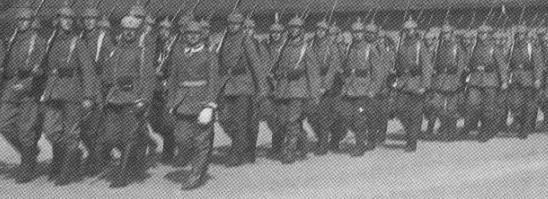
1914 List Regiment (Sep 1-Oct 7): Infantry Recrute Adolf Hitler's regiment begins a short but intensive basic training program, which is held in the premises of a large public school on the Elizabeth Platz in Munich. Hitler receives the first uniform of his life; basic greenish-grey with an "RIR 16" sown in red unto the epaulettes and a red stripe down the side of the trousers. The trousers are tucked into new leather boots, topped by a thick leather belt around the waist of the uniform jacket. [For further details, Click here.]
1915 Volkishness: A circular of the Franconian Germanenorden clarifies its aims, rules and rituals. The principal aim of the order is the monitoring of the Jews and their activities by the creation of a center to which all antisemitic material would flow for distribution. Subsidiary aims include mutual aid of brothers in respect to business introductions, contracts, and finance. Lastly, all brothers are committed to the circulation of voelkisch journals, especially the Hammer, their "sharpest weapon against Jewry and other enemies of the people."
Note: The articles of the Germanenorden state that all nationals, male or female, of flawless Germanic descent are eligible for admission. Application forms request details about the color of the applicant's hair, eyes, and skin. The ideal coloration is blond to dark blond hair, blue to light brown eyes, and pale skin. Details regarding the parents, grandparents and spouse are also required. A guide to recruitment states that physically handicapped or "unpleasant looking" people are barred. (THP) Note: Neither Hitler's nor Himmler's coloring was ideal, and Goebbels was physically handicapped.

1915 World War I: Gefreiter Adolf Hitler's 16 Reserve Infantry Regiment [List Regiment] occupy a position, at Fromelles (pictured above in a drawing by Hitler), which is on a level field with water channels, willow trees and willow stalks, in the distance towards the enemy lines lie an insignificant wood with barbed wire entanglements. Under the direction of their defense-minded commander, Lieutenant General Gustav Scanzoni von Lichtenfels, the regiment works ceaselessly day and night to further fortify their position at Fromelles while fighting off repeated assaults by the enemy. [For further details, Click here.]
1916 Volkishness: Baron Rudolf von Sebottendorff visits Hermann Pohl, leader of the mysterious Germanenorden in Berlin. Pohl tells Sebottendorff he first became interested in the esoteric study of the runes through Guido von List (above), and that he is convinced racial miscegenation, especially with Jews, was responsible for obscuring the "Aryan's" knowledge of the mystical powers of the runes. Pohl says he believes this gnosis can be revived once the race has been purified of foreign contamination. (THP)
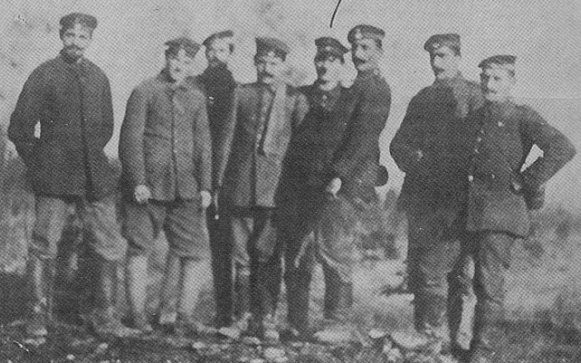 Hitler and his fellow dispatch runners
Hitler and his fellow dispatch runners
1916 World War I: Gefreiter Adolf Hitler endures trench warfare in Flanders (Artois) with 3 Company, 16 Reserve Infantry Regiment [List Regiment]. [For further details, Click here.]
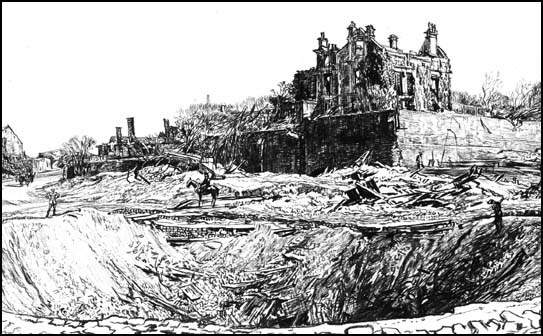
1917 World War I (September 11-30): The List Regiment is put on light duty, guarding a camp near Mulhouse in Alsace, the only section of the front on German soil. During this slow time, not only will Hitler and his comrades get a well-deserved respite from the rigors of trench warfare, but the heavily censored news from the Front seems to be improving as well. The news of the collapse of the Russian Front and the further defeats of Italian arms is, however, tempered by the news that German munitions workers have gone on strike. This mix of events give an impression that the war on the Front is going well, but being undermined by defeatism on the home front. [For further details, Click here.]
1917 World War I: German pilot Werner Voss shot down over Western Front: The German flying aceis shot down and killed during a dogfight with British pilots in the skies over Belgium, on the Western Front during World War I. [For further details, Click here]
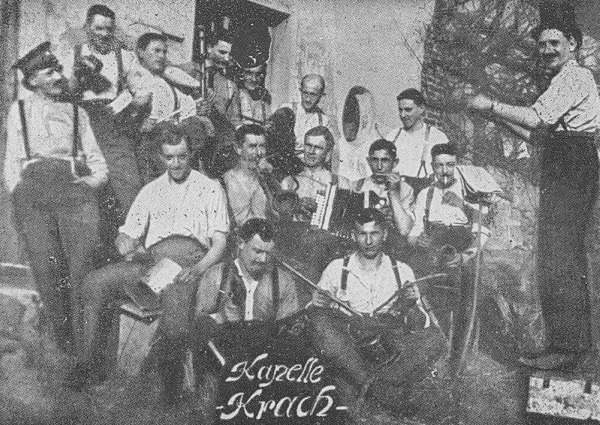
1918 World War I (August 21-September 27): Gefreiter Adolf Hitler attends a signals training course in Nuremberg. [For further details, Click here.]
1919 Nazi party: Walter Riehl sends copies of the Austrian Nazi program to Anton Drexler, chairman of the German DAP. Riehl suggests that Drexler change the name of his German organization to coincide with that of Riehl's Austrian Nazi party (DNSAP). (THP)
[See: Austria: The Other Germany.]1922 Weimar: Hitler gives a rousing speech, typical of his early style:
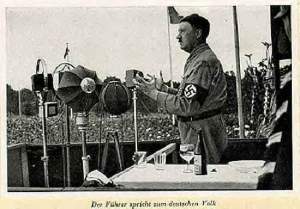
Then someone has said: "Since the Revolution the people have gained 'Rights.' The people governs!" Strange! The people have now been ruling three years and no one has in practice once asked its opinion. Treaties were signed which will hold us down for centuries: and who has signed the treaties? The people? No!.
1933 Various:
Nazi Eugenics: Genetic Health Courts are set up throughout Germany. Beginning in January 1934, they will eventually order the sterilization of almost 400,000 German citizens. (32,268 during 1934; 73,174 in 1935; 63,547 in 1936.) In the US 60,166 people were sterilized from 1907-1958) (THP)
Karl Maria Weisthor (Wiligut) joins the SS under the pseudonym Karl Maria Weisthor and is appointed head of a department for Prehistory and Early History within the SS Race and Resettlement Main Office in Munich. He had earlier been personally introduced to Himmler by his old friend Richard Anders. (THP)
Standard Oil geologists arrive in Saudi Arabia:
On September 23, 1933, a party of American geologists lands at the Persian Gulf port of Jubail in Saudi Arabia and begins its journey into the desert. That July, with the discovery of a massive oil field at Ghawar, Saudi King Abdel Aziz had granted the Standard Oil Company of California a concession to "explore and search for and drill and extract and manufacture and transport" petroleum and "kindred bituminous matter" in the country's vast Eastern Province; in turn, Standard Oil immediately dispatched the team of scientists to locate the most profitable spot for the company to begin its drilling.
1936 Karl Maria Weisthor (Wiligut) is promoted to SS-Brigadefuehrer (Brigadier) on Himmler's personal staff. Note: An undated typescript in the Bundesarchiv in Koblenz is a blueprint for the reestablishment of the Irminist religion in Germany, with detailed provisions for restrictions on the priesthood, the nationalization of all ecclesiastical property, and the restoration and conservation of ancient monuments. (THP)
1938 Sudeten Crisis: The new Czech government mobilizes its army. Mussolini offers to mediate the Czechoslovakian crisis. A conference is called to settle the issue at Munich, setting the stage for an Anglo-French sellout of Czechoslovakia, whose representatives are not even invited to attend.
Synagogues at Cheb and Marienbad in Czechoslovakia are burned by German-speaking citizens of the Sudetenland. (THP)
1939 Various:
Reich Foreign Minister (Joachim von Ribbentrop) to the German Ambassador in the Soviet Union (Schulenburg):

For the Ambassador personally: We, too, consider the time now ripe to establish by treaty jointly with the Soviet Government the definitive structure of the Polish area. The Russian idea of a border line along the well-known Four-Rivers Line coincides in general with the view of the Reich Government. It was my original intention to invite Herr Molotov to Germany in order to formulate this treaty. In view of your report that the leading personages there cannot leave the Soviet Union, we agree to negotiations in Moscow. Contrary to my original purpose of entrusting you with these negotiations, I have decided to fly to Moscow myself. This particularly because in view of the full powers granted me by the Fuehrer, thus making it possible to dispense with counter-inquiries, etc. negotiations can be brought to a speedier conclusion. In view of the general situation, my sojourn in Moscow will have to be limited to one or two days at the most. Please call on Herren Stalin and Molotov and wire me earliest proposed date.
Poland: Mussolini makes a speech stating that there is no reason to continue the war now that the Polish question has been settled.
Holocaust: In Piotrkow, Germans force several thousand Polish POWs, among them Jews, to relieve themselves in a synagogue and to clean the excrement with sacred objects. (THP)
Death: Sigmund Freud at 83, induced by an intentional morphine overdose after decades of pain and suffering due to mouth cancer.
1940 World War II: The George Cross: the highest British civilian award for acts of courage, is instituted.
1941: From a Memorandum regarding a conversation between Secretary of State Hull and Japanese Ambassador Nomura:
He (Ambassador Nomura) said that, as he had noted on previous occasions, perhaps not more than one-tenth of one percent of the Japanese people desired war with the United States, although of course if ordered to go to war the Japanese people would be ready. He felt that the holding of a meeting such as suggested would be of great value in counteracting the influence of the pro-Axis elements in the Japanese Government and in providing support for those elements desiring peaceful relations with the United States. [For further details, Click here.]
[See: Countdown to Infamy: Timeline to Pearl Harbor.]1942 Various:
Stalingrad: Soviet counterattacks to dislodge German advance units near the Volga landing stage are unsuccessful.
[See: What Were Adolf Hitler's Major Blunders?]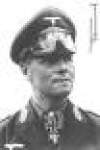
North Africa: Field Marshal Rommel takes a medical leave and hands over command of the Afrikakorps to General von Thoma.
Wendell Willkie: 1940 Republican presidential candidate, confers with Stalin and calls for a second front at the earliest possible moment.
Holocaust: "Gehsperre" action designed to make the Lodz ghetto a "working ghetto," is launched by the SS. All children under 10, all men and women over 60, and the sick or disabled are deported to the death camp at Chelmno. Within two weeks more than 16,000 are gassed. (THP)
1943 Various:
Mussolini re-establishes a fascist regime in northern Italy:
Benito Mussolini, deposed dictator of Italy, fashions a new fascist republic--by the leave of his new German masters--which he "rules" from his headquarters in northern Italy.
In July 1943, after a Grand Council vote of "no confidence," Mussolini was thrust from power and quickly placed under house arrest. The Italian masses, who had so enthusiastically embraced him for his promises of a new Italian "empire," now despised him for the humiliating defeat they had suffered during the war. But Mussolini still had one fan--Adolf Hitler.
Gen. Pietro Badoglio, who had assumed authority in Mussolini's absence, knew there might be an attempt to break the former Duce out of his confinement, and so moved him to a hotel in the Apennine Mountains. Despite the presence of an entire army of armed police, German commandos in a bold move swept onto an Apennine mountain peak from the air, overran the hotel, and flew Mussolini to Hitler's headquarters on the Russian front.
Mussolini could not sit still long and wanted to return to Italy to reassume power. But his German "patrons" had no intention of allowing him, whom they regarded as incompetent, to return to the scene of the disaster. So in order to pacify--and control--him, he was set up in a German-controlled area of northern Italy, Gargnano, on Lake Garda. Mussolini set about creating a reformed version of fascism, one that supposedly had learned from past mistakes and included elections and a free press. His "Verona Manifesto" was the blueprint for this new fascist republic-the Republic of Salo--where his government departments had fled in light of the Italian surrender to the Allies.
Of course, there were never any elections in the new fascist republic, and no freedom of anything. Salo was little more than a police state clogged with aging Black Shirts--corrupt, viscous, and delusional. And Mussolini, geographically removed from Salo, ensconced at Lake Garda as he was, controlled nothing. He was little more than a puppet of the Germans, spewing anti-Allied propaganda and avenging himself and his masters on traitors to the party by ordering the executions of former Grand Council members--including his own son-in-law, Count Ciano. Eventually, the Allied advance into northern Italy, and the brave guerilla warfare waged by the Italian partisans, spelled the end of Salo-and its paper ruler. (History.com)
[See: How Did the Pact of Steel Effect Germany and Italy?]Romania: Hitler meets with Ion Antonescu and asks him not to receive an anti-Mussolini Italian envoy, and to dismiss Mihai Antonescu. Marshal Antonescu refuses to comply.
Holocaust: The Vilna ghetto is liquidated by the Germans. (THP)
Church and Reich: Ernst von Weizsaecker, the new German Ambassador at the Vatican, reports to Berlin that Secretary of State Maglione regards the fate of Europe as dependent upon "the victorious resistance of Germany at the Russian front." If the German armies collapse there, the only possible bulwark against Bolshevism will fall and European civilization will be lost." (THP)
1944 Various:
World War II: The First Polish Independent Parachute Brigade under General Stanislaw Sosabowski, suffers heavy casualties in the capture of a bridge over the Rhine at Arnhem.
1944 FDR defends his dog:
During a campaign dinner with the International Brotherhood of Teamsters union, President Franklin D. Roosevelt makes a reference to his small dog, Fala, who had recently been the subject of a Republican political attack. The offense prompted Roosevelt to defend his dog's honor and his own reputation.
After addressing pertinent labor issues and America's status in World War II, Roosevelt explained that Republican critics had circulated a story claiming that Roosevelt had accidentally left Fala behind while visiting the Aleutian Islands earlier that year. They went on to accuse the president of sending a Navy destroyer, at a taxpayer expense of up to $20 million, to go back and pick up the dog. Roosevelt said that though he and his family had "suffered malicious falsehoods" in the past, he claimed the right to "object to libelous statements about my dog." Roosevelt went on to say that the desperate Republican opposition knew it could not win the upcoming presidential election and used Fala as an excuse to attack the president. He half-jokingly declared that his critics sullied the reputation of a defenseless dog just to distract Americans from more pressing issues facing the country.
Roosevelt was indeed attached to his dog. Fala, a small, black Scottish terrier, accompanied Roosevelt almost everywhere: to the Oval Office, on official state visits and on long, overseas trips including one to Newfoundland in 1941 during which Fala met British Prime Minister Winston Churchill. Roosevelt's cousin, Margaret Suckley, had given Fala to the president in 1940 when Fala was still a puppy. Although Eleanor Roosevelt disapproved of having a dog in the White House, Roosevelt adamantly kept the dog by his side. Fala slept at the foot of his master's bed and only the president had the authority to feed him; the White House kitchen staff sent up a bone for Fala every morning with Roosevelt's breakfast tray.
After FDR's death, Fala lived with Eleanor and, when the dog died in 1952 at the ripe old age of 12, he was buried near the president at his family home in Hyde Park, New York. (History.com)
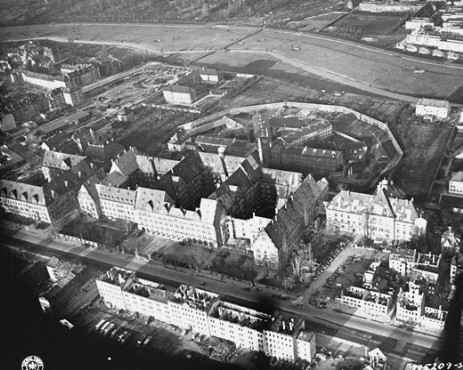
1946 Nuremberg Tribunal: The justices meet to discuss verdicts in the Major War Criminals Trial. (See: 30 September 1946)
1949 Truman announces Soviets have exploded a nuclear device:
In a surprisingly low-key and carefully worded statement, President Harry S. Truman informs the American people that the Soviets have exploded a nuclear bomb. The Soviet accomplishment, years ahead of what was thought possible by most U.S. officials, caused a panic in the American government.
The United States developed the atomic bomb during the latter stages of World War II and dropped two bombs on Japan in August 1945. By the time of the bombings in Japan, relations between the United States and the Soviet Union were already crumbling. Many U.S. officials, including President Truman, came to see America's atomic monopoly as a valuable asset in the developing Cold War with Russia. Most American officials, and even the majority of scientists in the United States, believed that it would be many years before the Soviets could develop an atomic bomb of their own, and by that time the United States would have achieved a vast numeric superiority. On September 3, 1949, however, U.S. scientists recorded seismic activity from inside the Soviet Union that was unmistakably the result of an underground nuclear test. Truman, informed of this development, at first refused to believe it. He ordered his scientific and military advisers to recheck their data. Once they confirmed the results, however, Truman had to face the fact that America's nuclear monopoly was gone. He also had to face the task of informing the American people, for the news was sure to leak. On September 23, he issued a brief statement to the media. "We have evidence," the statement read, "within recent weeks an atomic explosion occurred in the USSR." The president attempted to downplay the seriousness of the event by noting that "The eventual development of this new force by other nations was to be expected. This probability has always been taken into account by us."
What had not been taken into account by the U.S. government was the fact that the Soviets, like the Americans, had captured many German scientists after World War II who had been working on nuclear development. In addition, the United States was unaware of the scope of Soviet spy efforts to gain valuable information. Years ahead of what Americans thought possible, the Soviets had exploded a nuclear device. Truman reacted by requesting an intensive re-evaluation of America's Cold War policies by the National Security Council. The report, issued to the president in early 1950, called for massive increases in military spending and a dramatic acceleration in the program to develop the next stage of nuclear weaponry--the hydrogen bomb. (History.com)
1954 East Germany: Police arrest 400 citizens as US spies.
Edited by Levi Bookin (Copy editor)
levi.bookin@gmail.com



Click to join 3rdReichStudies



Disclaimer: This site includes diverse and controversial materials--such as excerpts from the writings of racists and anti-Semites--so that its readers can learn the nature and extent of hate and anti-Semitic discourse. It is our sincere belief that only the informed citizen can prevail over the ignorance of Racialist "thought." Far from approving these writings, this site condemns racism in all of its forms and manifestations.
Fair Use Notice: This site may contain copyrighted material the use of which has not always been specifically authorized by the copyright owner. We are making such material available in our efforts to advance understanding of historical, political, human rights, economic, democracy, scientific, environmental, and social justice issues, etc. We believe this constitutes a "fair use" of any such copyrighted material as provided for in section 107 of the US Copyright Law. In accordance with Title 17 U.S.C. Section 107, the material on this site is distributed without profit to those who have expressed a prior interest in receiving the included information for research and educational purposes. If you wish to use copyrighted material from this site for purposes of your own that go beyond 'fair use', you must obtain permission from the copyright owner.
Please Note: The list-owner and the moderator of 3rdReichStudies are not responsible for, and do not necessarily approve of, the random ads placed on our pages by our web server. They are the unfortunate price one pays for a 'free' website.